A total of 59 bills were introduced in Parliament in the year 2019. Some of them were significant as well as controversial. Here is a roundup of the 10 most important bills passed in 2019.
Narendra Modi took oath as the Prime Minister of India for a second term on 30 May 2019, following the massive victory of BJP and allies in the 2019 Lok Sabha elections. Hence, the 16th, as well as the 17th Lok Sabha (Modi’s 1st & 2nd term) , were both in session during 2019. The year 2019 witnessed the passing of many important and highly debated bills in parliament. Some of these bills led to controversies and are now challenged in the Supreme Court.
How many Parliament Sessions were convened in 2019?
While the Winter Session of 2018 (16th Lok Sabha) concluded on 09 January 2019, the interim Budget Session of the 16th LS lasted for a fortnight between 31 January 2019 and 13 February 2019. The first session of the 17th LS commenced on 17 June 2019 and continued till 07 August 2019. The Winter Session of 2019 which began on 18 November 2019 came to an end on 13 December 2019.
A total of 59 Bills were introduced in both Lok Sabha and Rajya Sabha in 2019 as per the data available on the website of the Ministry of Parliamentary Affairs (MPA). A snapshot of the parliamentary work undertaken in 2019 is also available on the MPA website.
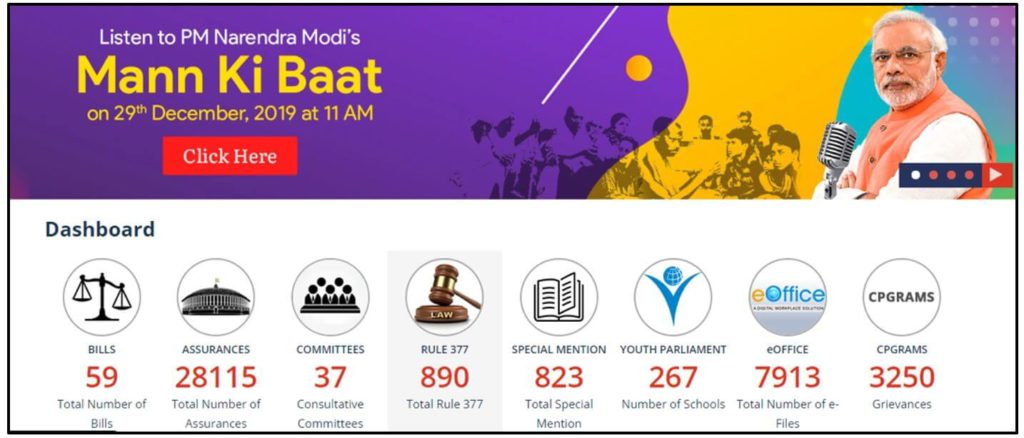
Factly takes a look at ten of the most significant bills passed in 2019. The acts have been listed out in the order in which they were introduced.
1. The Muslim Women (Protection of Rights on Marriage) Bill (Triple Talaq)
The Bill was introduced in June 2019 replacing an earlier ordinance. The act deems the practice of ‘triple talaq’ or ‘talaq-e-biddat’, in any form- oral, written or electronic void and illegal. ‘Talaq’ is a term pronounced by Muslim husbands thrice to divorce their wives. Following the passage of the bill, the declaration of ‘talaq’ has been made a cognisable offence (arrest without warrant) which can result in imprisonment of up to three years in addition to a penalty. The offence is cognisable only if the complaint has been registered by the woman or her relatives. The wife will be the custodian of the children and is also entitled to get a subsistence allowance from her husband for herself and their children. The act can be accessed here.
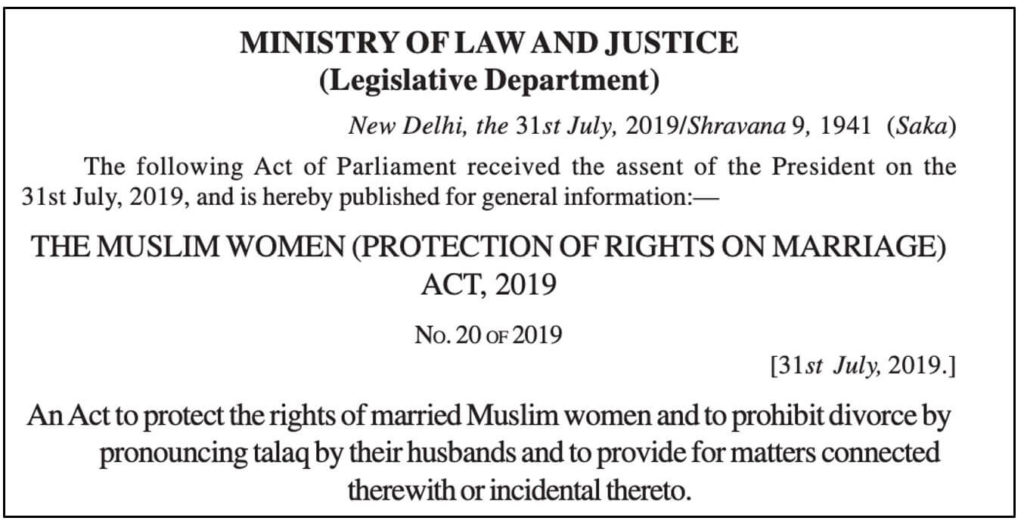
2. The new Consumer Protection Bill, 2019
On 08 July 2019, the new Consumer Protection Bill was introduced in the Lok Sabha. Passed in August, the Act replaced the erstwhile Consumer Protection Act, 1986.
The 2019 act has introduced a new Central Consumer Protection Authority ‘to promote, protect and enforce the rights of the consumers.’ Product Liability is another important concept introduced in the Act that mandates the service provider to compensate the consumer for loss or injury due to a manufacturing defect in the product or poor service.
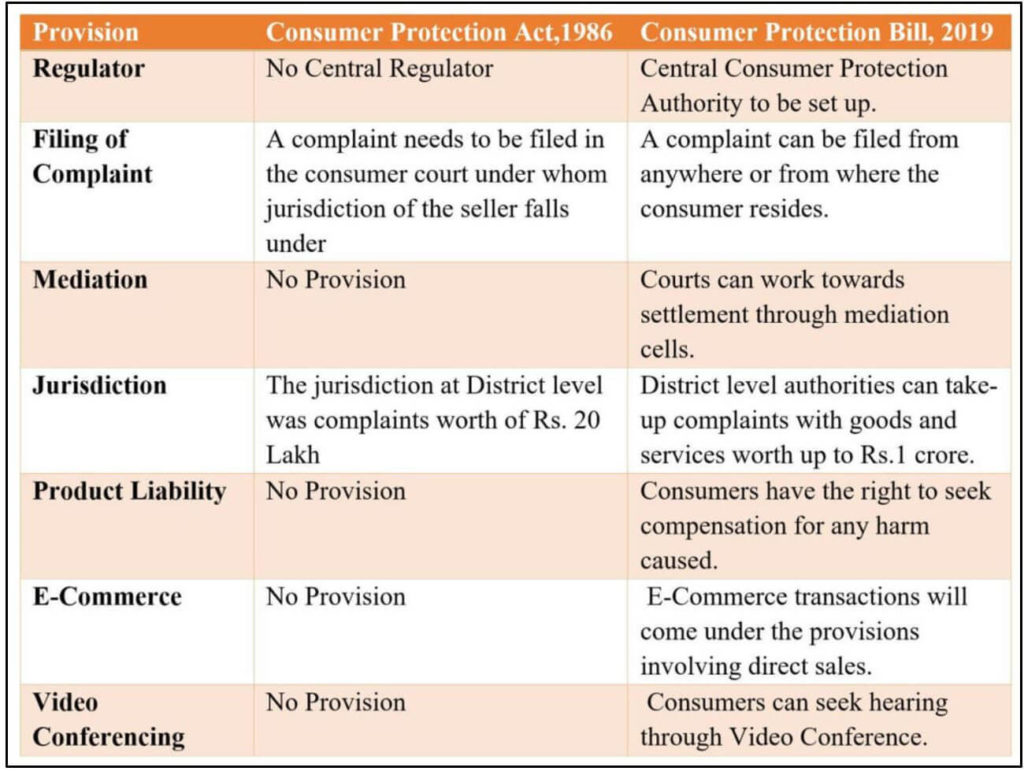
Provisions on e-commerce have also been included in the new act. All laws pertaining to direct selling are applicable for e-commerce platforms such as Amazon, Flipkart, etc. Product Liability, in this case, would include sellers as well as the e-commerce aggregators. Misleading advertisements can lead to an imprisonment of two years and a fine up to Rs 10 Lakhs. Even the endorser of misleading advertisements can face a ban of one year. Consumer litigation has been simplified through the enactment of this act since it permits electronic filing of complaints and the complainant to attend hearing through video conference. Here is the link to Factly’s explainer on the new law. Also, watch our ‘Decode’ episode on Consumer Rights here. Also, watch the ‘Decode’ episode on the process for filing a complaint with the consumer forum.
3. The National Investigation Agency (Amendment) Bill
The National Investigation Agency (NIA) was set up by the government through the enactment of the National Investigation Act, 2008 to investigate specific cases under certain laws. The NIA amendment bill passed in July this year allows NIA to investigate terrorist activities against Indians and Indian interests outside the country as well. As per the 2008 Act, only activities which are deemed crimes under the acts mentioned in the schedule could be probed by NIA.
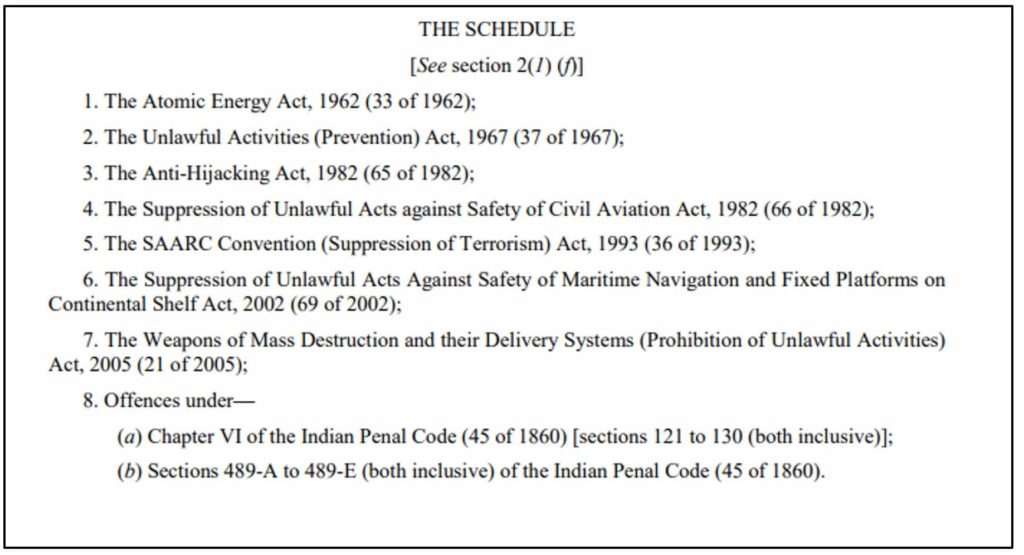
The amendment has added multiple sections of Indian Penal Code and other acts to the schedule, thus expanding the scope of crimes that could be investigated by the NIA. The NIA can now investigate offences pertaining to human trafficking, counterfeit currency, cyber terrorism and those under Arms Act and Explosive Substances Act, 1908. The gazette notification of the amendment can be found here.
4. The Unlawful Activities (Prevention) Amendment Bill
Introduced in the Lok Sabha on 08 July 2019, the objective of the bill was to amend the existing Unlawful Activities (Prevention) Act, 1967 . This bill led to heated debates in parliament. While the 1967 act included only terrorist organisations, the amendment empowers the government to designate an individual as a terrorist through official gazette notification by adding their name in the fourth schedule under the act. The individual may or may not be given a chance to be heard. The anti-terror law was criticised and challenged in the Supreme Court for the same.
Masood Azhar, wanted by India for multiple terror-related offences has been designated as a terrorist in September 2019 after the amendment.
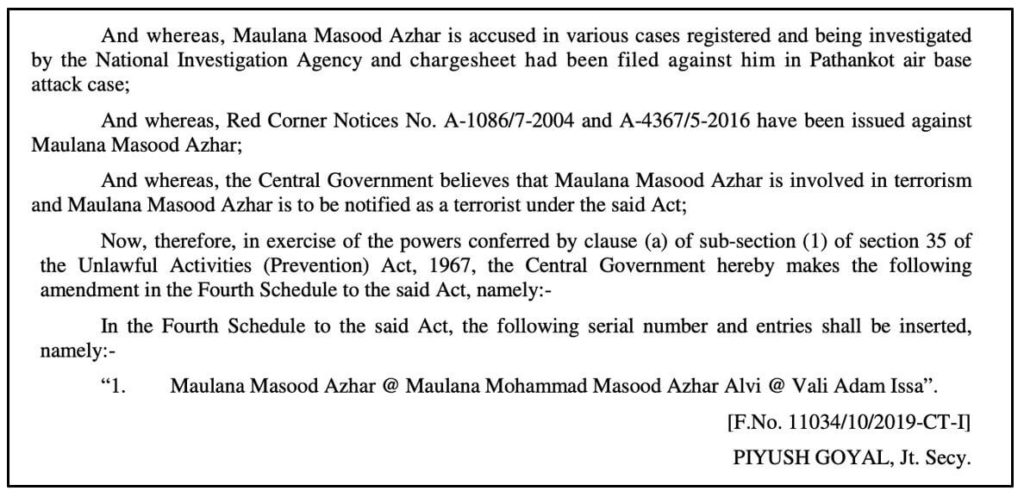
Prior to amending the act, officers of the rank of Deputy Superintendent or Assistant Commissioner of Police and above were only allowed to investigate cases, but now, NIA officers of the rank of inspector and above are also empowered to carry out investigations under this act. Prior approval from the Director General of Police of the State Police in which the property is situated was required to confiscate property related to terrorism. As per the amendment, for investigations being conducted by NIA officers, they will require sanction only from the Director General of NIA, bypassing the DGP of State Police.
International Convention for Suppression of Acts of Nuclear Terrorism (2005) has also been added to second schedule of UAPA Act that lists the international treaties which define terrorism and also adopted by India.
5. The Motor Vehicles (Amendment) Bill
Also passed in the parliament in July 2019, the Motor Vehicles (Amendment) Act has made the existing rules more stringent as compared to the Motor Vehicle Act of 1988. The amendment has substantially enhanced the penalties and fines for various violations (double to ten times the hitherto) in an attempt to have a deterrence effect and in the process reduce the number of such traffic violations. Standards for vehicles, grants, permits and licenses related to motor vehicles have also been covered under this amendment. Factly’s explainer on what owners/drivers of vehicles should know about the revised hefty fines under this act can be read here.
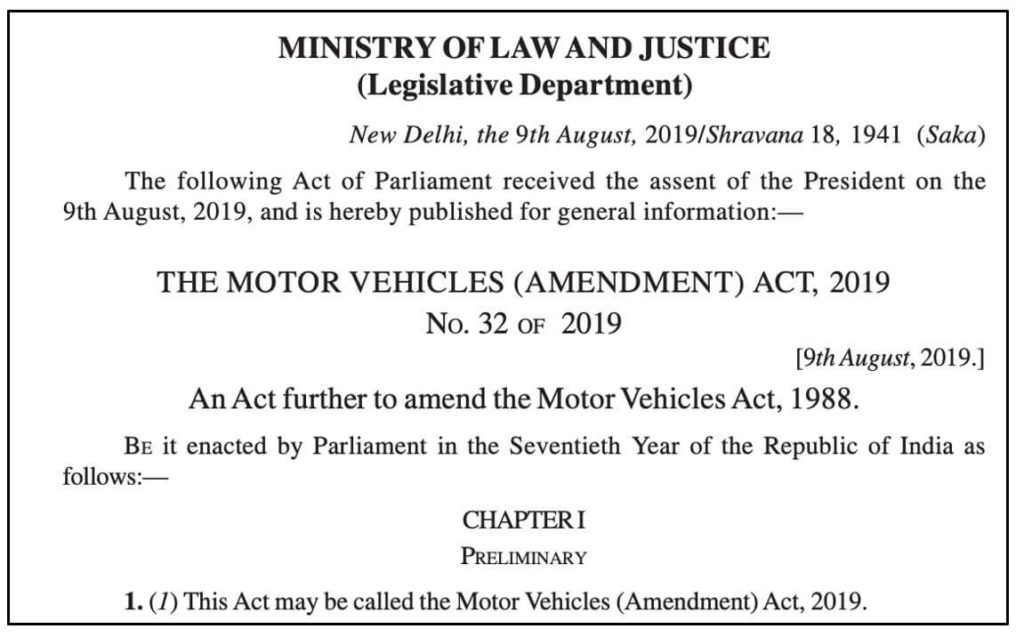
6. The Right to Information (Amendment) Bill
The RTI bill of 2019 amended the 2005 Act by vesting the power to determine office tenure, salaries and allowances of Information Commissioners in the central government. Earlier, the Chief Information Commissioner and other Information Commissioners in the Central Information Commission (CIC) had a fixed tenure of five years and their salaries were benchmarked with that of Chief Election Commissioner and Election Commissioners respectively. The amendment was brought in by the Centre claiming that functions of Election Commission and that of Information Commission are different and hence the amendment was necessary.
This amendment was severely criticized both outside and inside the parliament for it was deemed to reduce the status of the commissioners and thereby the autonomy of the commission. The bill was introduced in the Lok Sabha on 19 July 2019 and was notified in the gazette on 01 August. The rules were subsequently notified through which the tenure of information commissioners has been reduced to 3 years from 5 years.
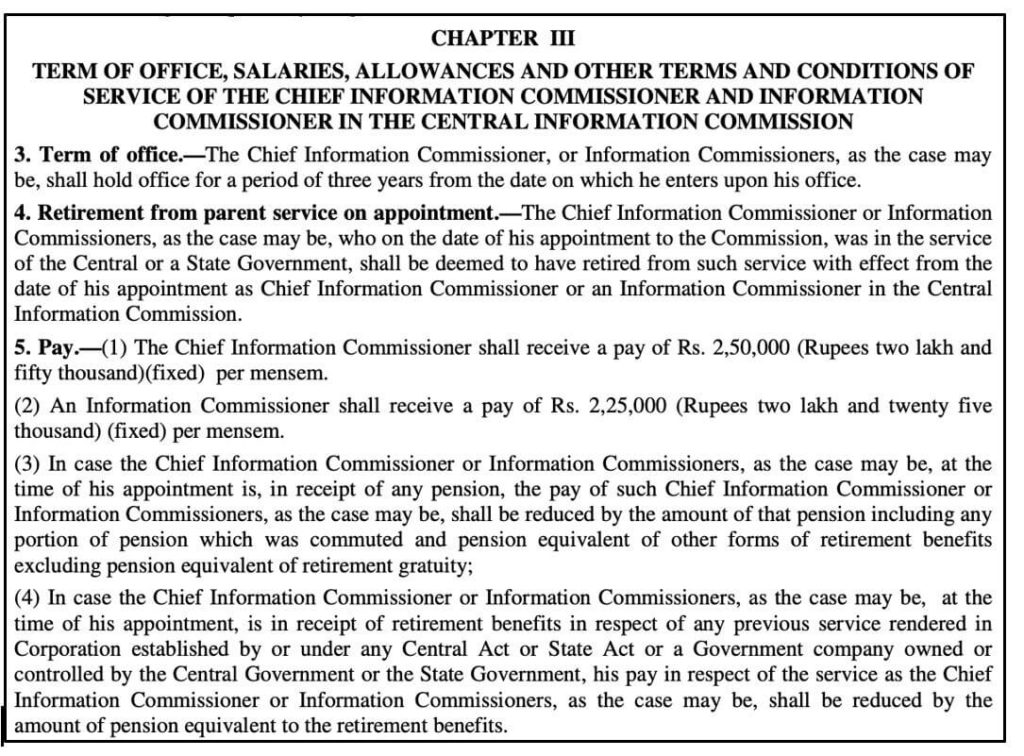
7. The Transgender Persons (Protection of Rights) Bill
Even though the bill was introduced in the Lok Sabha in July, it became an act only on 05 December 2019. The act defines a transgender person as someone whose gender does not match that assigned at birth. Further, the act bans any sort of discrimination against them in education, healthcare, employment and residence. However, they have to obtain a certificate from the District Magistrate stating their gender as transgender. Gender should also be changed in all official documents. It also calls for establishing a National Council for Transgender persons (NCT) headed by Union Minister for Social Justice which will have to monitor policies policy formulation and legislation related to transgender persons. Pride march and protests were held against the act as it lacks clarity in many aspects and also introduces bureaucratic procedures for identifying oneself as a transgender. The protestors say that the act goes against the directions of the Supreme Court in the landmark 2014 judgment.
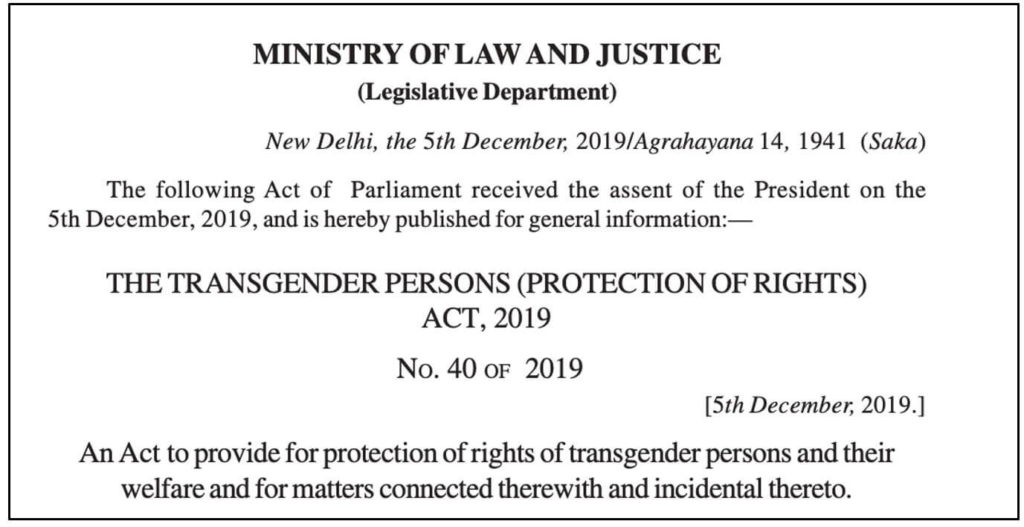
8. The National Medical Commission Bill
Nationwide protests by the medical fraternity were witnessed in July this year following the enactment of the National Medical Commission Act that annulled the Indian Medical Council Act, 1956. National Medical Commission is to be set up under the Act superseding Medical Council of India to regulate medical education and profession in the country. NEET and NEXT were introduced as common entrance exams for admissions into under-graduation and post-graduation respectively. The act has also decided to give a limited license to ‘Community Health Providers’ to practice medicine. However, the criteria and regulations are yet to be framed. The act was opposed for being ‘draconian’ and ‘poorly drafted’. Details of the exams were also not disclosed then. A detailed explainer of the bill by Factly is available here.
The Indian Medical Council (Amendment) Bill was also passed by the government earlier in 2019 which provided for supersession of Medical Council of India Act in two years from September 2018 and also increased the number of members from 7 to 12.
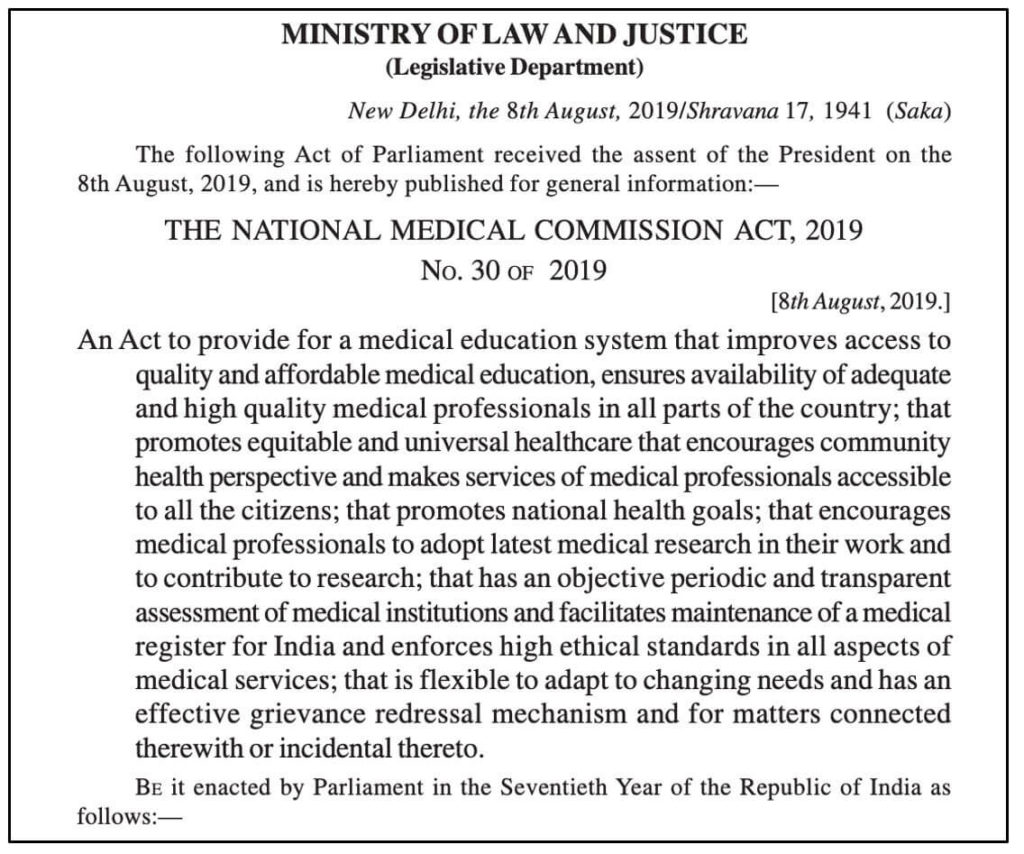
9. The Jammu and Kashmir Reorganisation Bill
On 31 October 2019, the Jammu and Kashmir Reorganisation Act came into effect despite strong opposition, that reorganised state of Jammu and Kashmir as Union Territory of Jammu and Kashmir with a legislature, and Union Territory of Ladakh without a legislature. The President appointed a Lieutenant Governor each to administer the UTs. Articles 370 and 35A of the Indian constitution which granted special status to the state were abrogated. Now, all the laws and provisions applicable elsewhere in India are also applicable to these two new UTs. State-specific laws were also repealed including a prohibition on leasing land to non-permanent citizens of Jammu and Kashmir. Internet shutdown and vehement protests were witnessed in the erstwhile state.
The Jammu and Kashmir Reservation (Amendment) Bill was also passed by the government which provided 3% reservation in services and educational institutions to people who live near the international border in J&K and to those living close to the Line of Control.
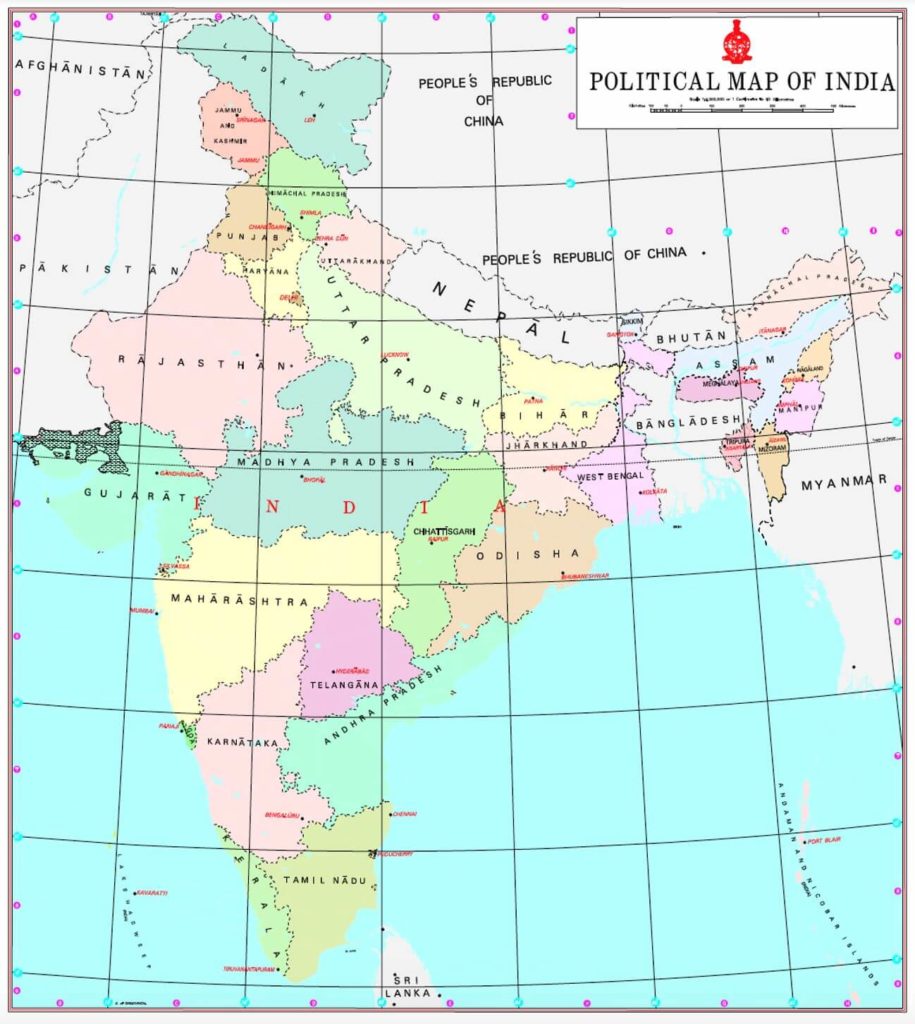
10. The Citizenship (Amendment) Bill
This bill makes the persecuted religious minorities- Hindus, Sikhs, Jains, Buddhists, Parsis and Christians- from three neighbouring countries of Pakistan, Bangladesh and Afghanistan who entered India before 2015 irrespective of possession of valid documents, eligible to apply for citizenship. They will be deemed, legal migrants. The amendment also allows persons from the specified countries and specified religions gain citizenship faster than others by naturalization since the 11-year period is reduced to 5-years. On the other hand, Muslims from these three countries can still apply for citizenship by naturalization provided they have valid documents, have not been declared an illegal migrant and have satisfied the 11-year criteria for naturalization.
It was passed in the parliament and became an act on 12 December 2019. The passage of the bill in the parliament resulted in vociferous protests across the country for varied reasons such as the exclusion of Muslims, cultural erosion and economic reasons. Linking this act with the National Register of Citizens (NRC) also led to apprehensions that certain communities may be excluded. Factly’s explainer of the Act is available here. Answers to FAQs on CAA and NRC have also been published by Factly earlier.
What are the other important laws & amendments passed in 2019?
The Special Protection Group (Amendment) Bill was passed limiting the special security to former prime ministers and their immediate family members to five years from the end of their tenure. The Supreme Court (Number of Judges) Amendment Bill increased the maximum number of SC judges from 30 to 33.
A complete ban on e-cigarettes was brought through the Prohibition of Electronic Cigarettes (Production, Manufacture, Import, Export, Sale, Distribution, Storage and Advertisement) Bill while the Arms (Amendment) Bill reduced the number of licensed firearms allowed per person and enhanced fines for offences under the act.


